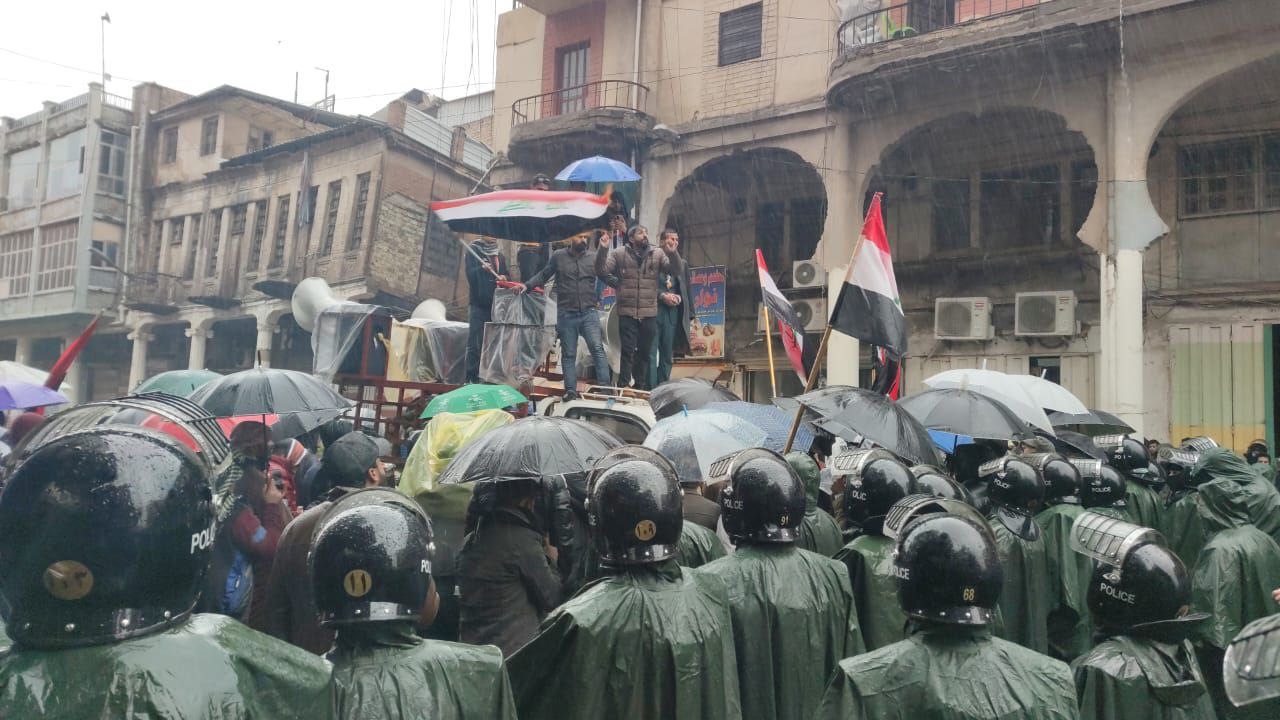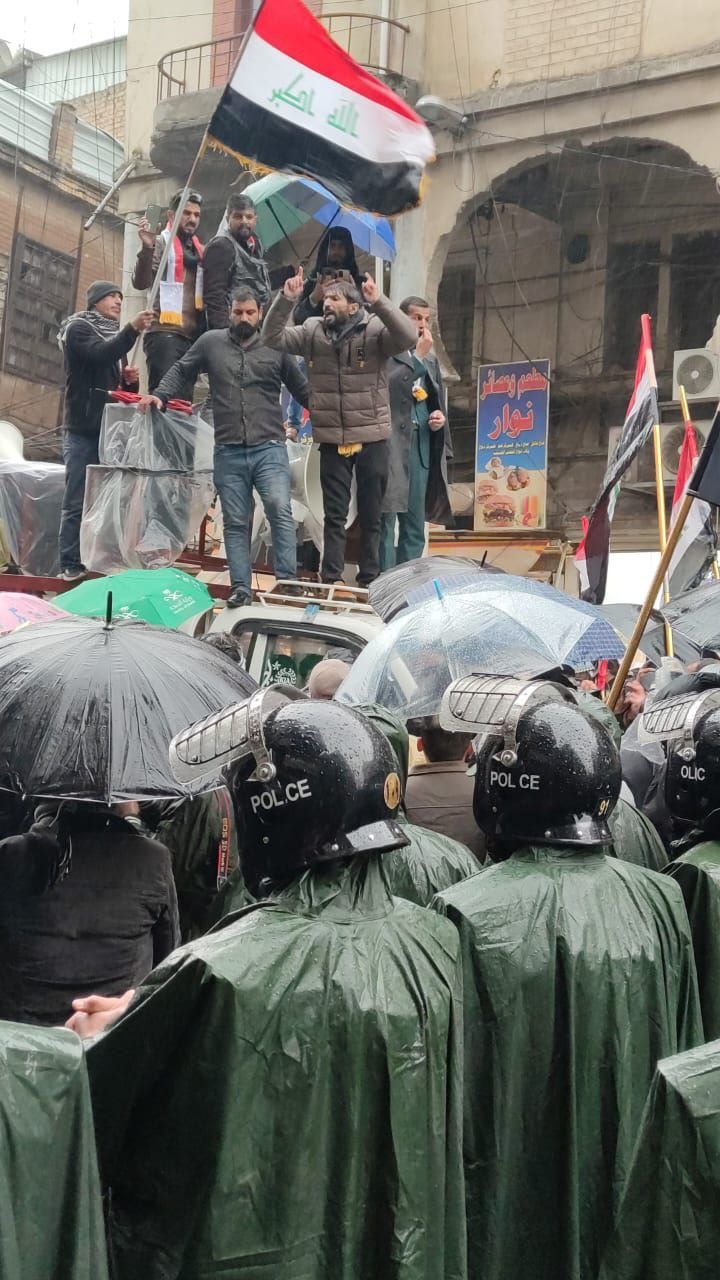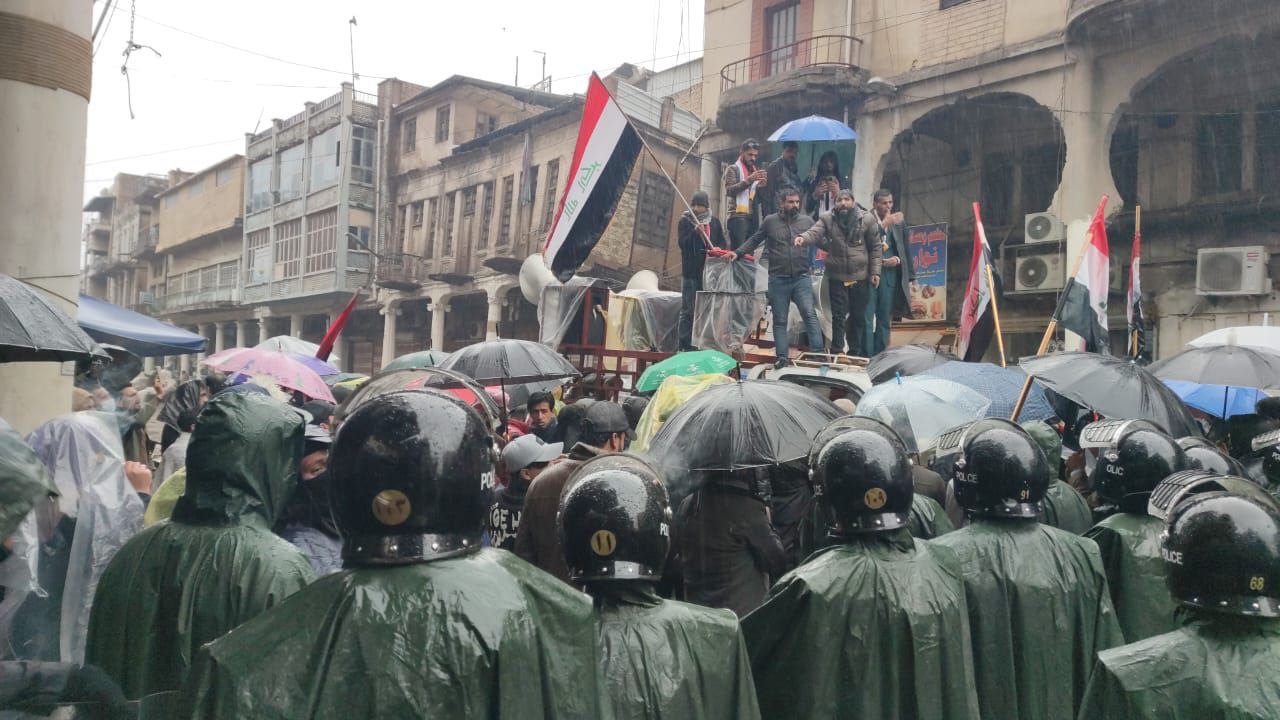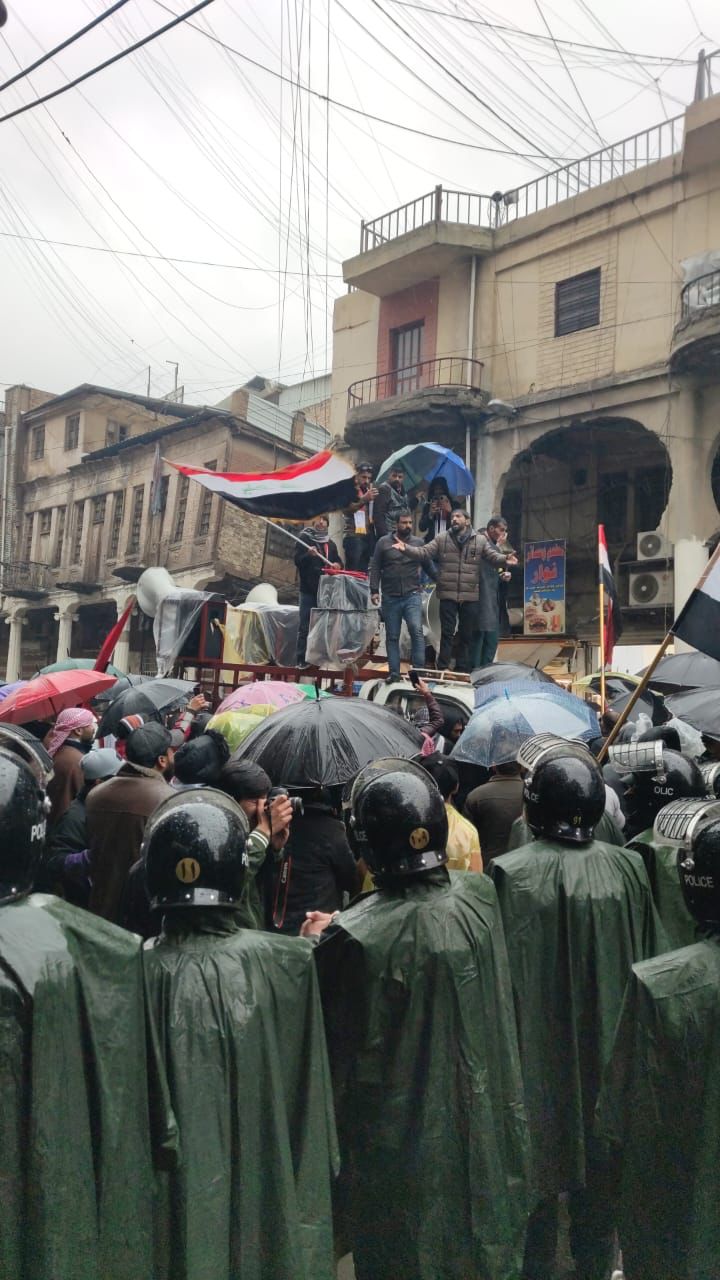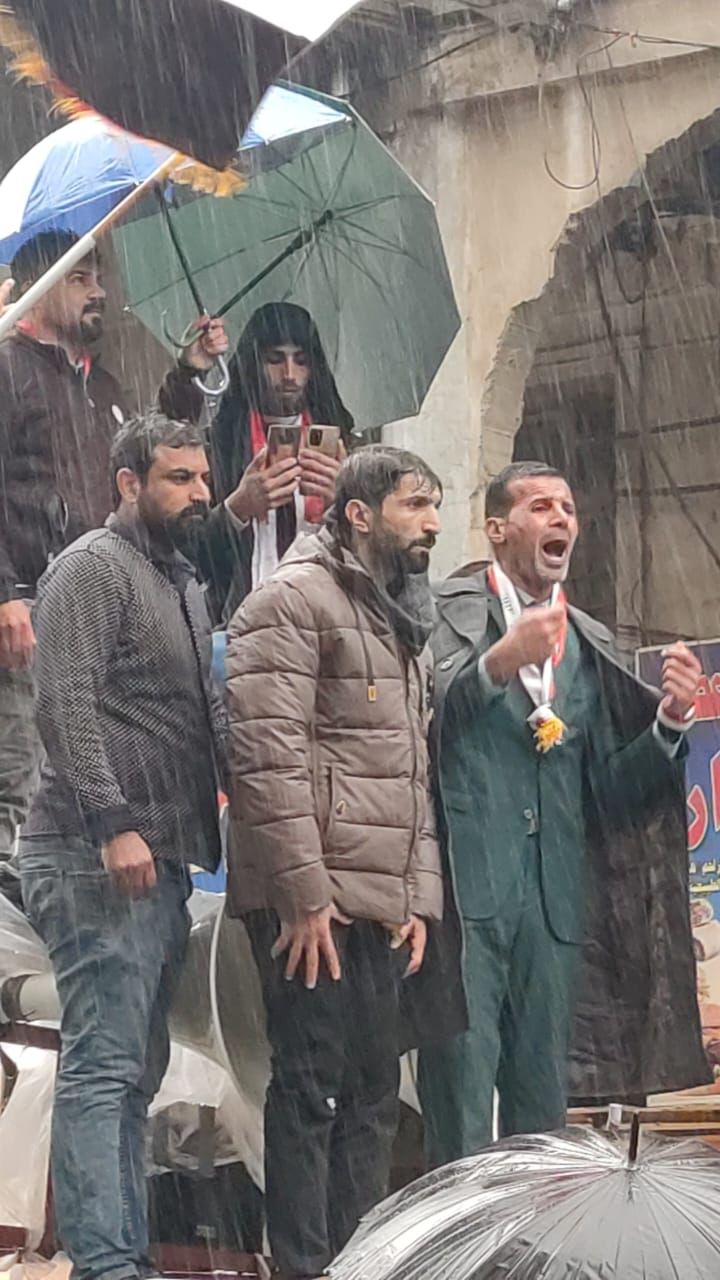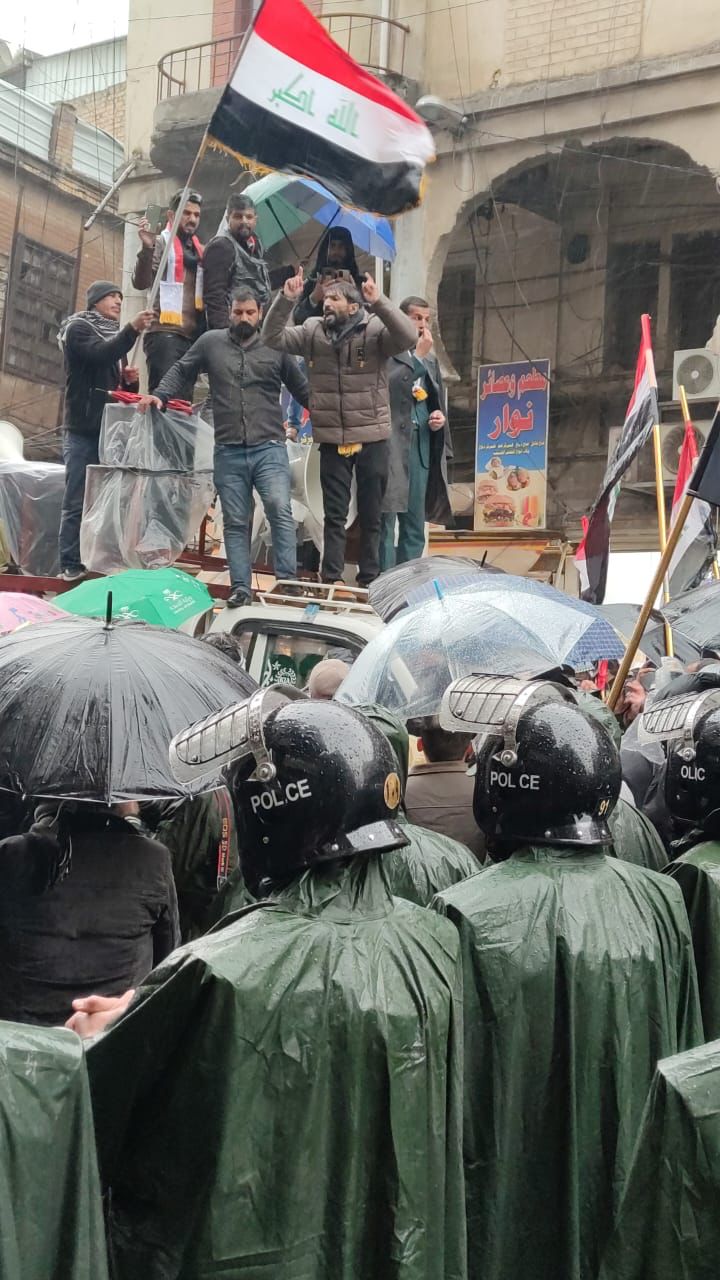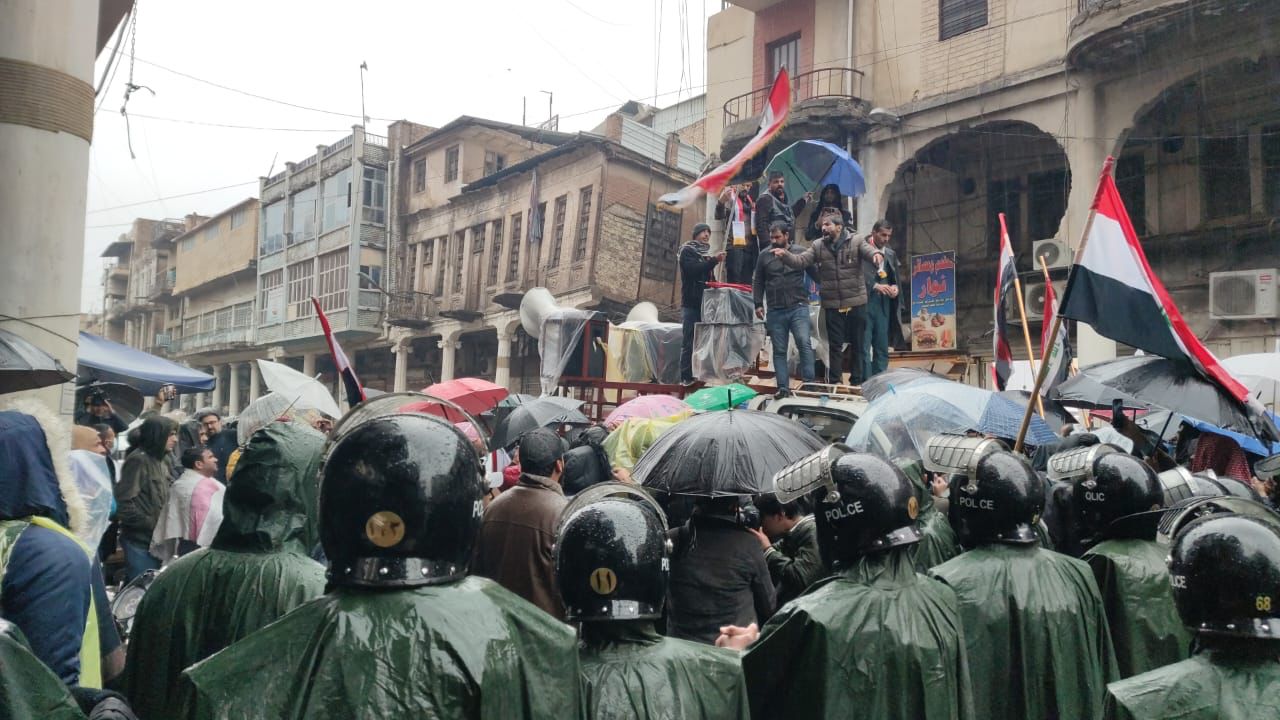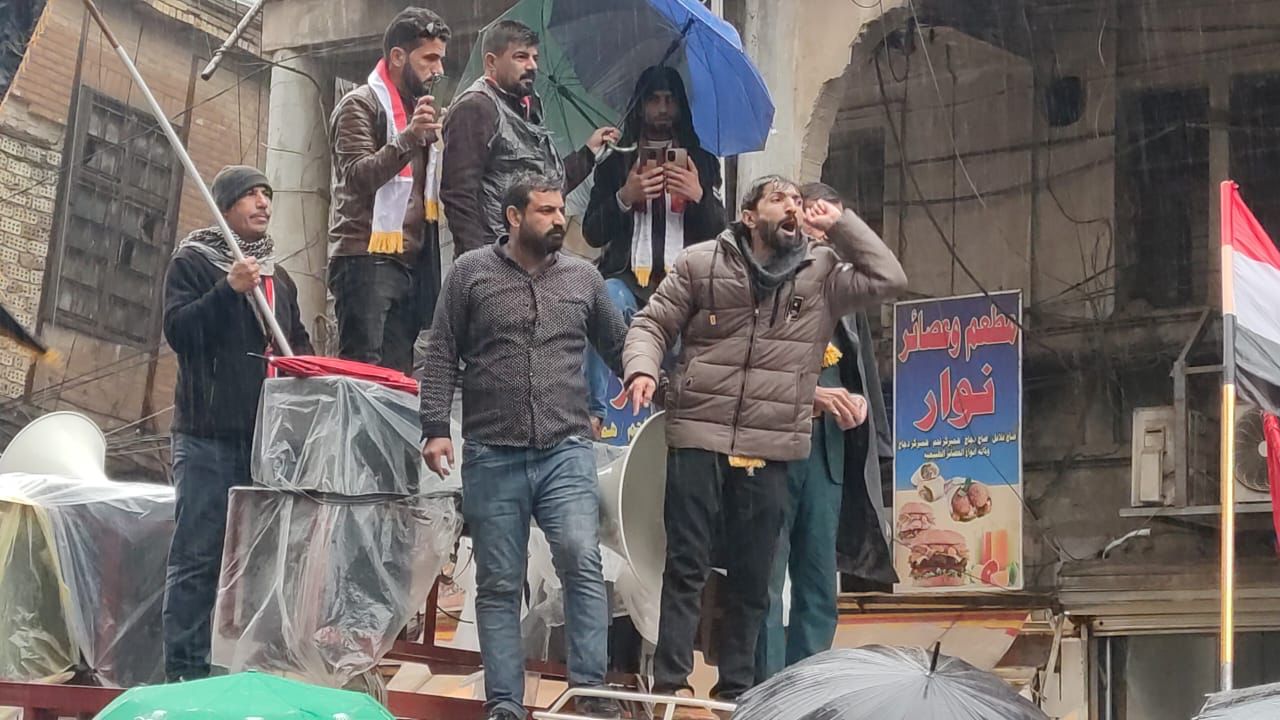Iraq Economy Reels as U.S. Moves Against Money Flows to Iran
BAGHDAD—Iraqis are blaming an unexpected culprit for a weakening currency that has caused the price of food and imported goods to rise: a little-noticed policy change by the U.S. Treasury and the Federal Reserve Bank of New York.
The New York Fed began enforcing tighter controls on international dollar transactions by commercial Iraqi banks in November, in a move to curtail money laundering and the illegal siphoning of dollars to Iran and other heavily sanctioned Middle East countries, U.S. and Iraqi officials said.
Iraqi banks had operated under less stringent rules since shortly after the 2003 U.S. invasion that toppled Saddam Hussein. Almost two decades later, American and Iraqi officials said they have decided it was time to bring Iraq’s banking system into compliance with global money-transfer practices.
Since the procedures went into effect, 80% or more of Iraq’s daily dollar wire transfers—which previously totaled over $250 million some days—have been blocked because of insufficient information about the funds’ destinations or other errors, according to U.S. and Iraqi officials and official Iraqi government data.
With dollars scarce, Iraq’s currency has fallen as much as 10% against the dollar, leading to sharply higher prices for imported goods, including staples such as eggs, flour and cooking oil.
“For 20 years we followed the same system,” said Mahmood Daghir, chairman of Al Janoob Islamic Bank and a former Central Bank of Iraq official. “But the shock policy by the Fed has made a crisis inside the Iraqi economy.”
The turmoil exemplifies the wary but interwoven relationship between Washington and Baghdad. Since the U.S. helped establish the Central Bank of Iraq in 2004, the U.S. dollar has largely become the country’s chief currency because so much of the economy runs on cash.
To keep Iraq supplied with dollars, planes deliver pallets of U.S. currency to Baghdad every few months. But far more dollars flow electronically in transactions by Iraq’s private banks, processed from Iraq’s official accounts at the New York Fed where proceeds from its oil sales are deposited.
U.S. officials say the tighter rules for electronic dollar transfers by Iraqi private banks weren’t a surprise to officials in Baghdad. They were implemented jointly in November after two years of discussions and planning by the Central Bank of Iraq, the U.S. Treasury and the Fed. The rise in the dollar exchange rate wasn’t caused by the new measures, the U.S. officials added.
But the scrutiny of dollar transactions has set off a rush for greenbacks in Iraq and a torrent of criticism from Iraqi officials, bankers and importers who blame the new system for an unnecessary financial jolt that has worsened their already severe economic woes.
Iraqi Prime Minister Mohammed al Sudani, who took office just as the currency began to drop, said the Fed’s action was harming the poor and threatening his government’s 2023 budget.
“This is embarrassing and critical for me,” he said in an interview. He said that he would send a delegation to Washington next month with a proposal for a six-month moratorium on the new policy.
Some senior Iraqi officials with ties to Iran have been even more critical. “Everyone knows how the Americans use the currency as a weapon to starve people,” Hadi al-Amiri, the head of an Iranian-backed political party and militia, told the French ambassador in a Jan. 10 meeting, according to an account released by Mr. Amiri’s office.
Under the new procedures, Iraqi banks have to submit dollar transfers on a new online platform with the central bank, which are then reviewed by the Fed.
The system is aimed at curtailing use of Iraq’s banking system to smuggle dollars to Tehran, Damascus and money-laundering havens across the Middle East, U.S. officials said.
Under the old rules, Iraqi account holders weren’t required to disclose to whom they were sending money until after the dollars had already been transferred, said Mr. Daghir, the former central bank official.
A spokeswoman for the New York Fed said of accounts it maintains for foreign governments, such as Iraq’s, “We have a robust compliance regime for these accounts that evolves over time in response to new information.”
A U.S. official said the measures would limit “the ability of malign actors to use the Iraqi banking system.”
The U.S. Treasury and the Central Bank of Iraq declined to comment. The Iraqi central bank described the new electronic platform in a Dec. 15 statement that said it required “full details of customers who want money transfers,” including final beneficiaries.
“A number of mistakes are being discovered and banks are required to redo the process,” the statement said. “Such procedures will take additional time before getting accepted and passed by the international system.”
The central bank also barred four banks—Islamic Asia Bank, Iraqi Middle East Bank, Ansari Islamic Bank and Al Qabudh Islamic Bank—from carrying out any dollar transactions, according to Iraqi officials and court documents. Executives at Asia Bank and Ansari bank declined to comment, while the two other institutions couldn’t be reached.
U.S. officials have pressed Iraq for years to strengthen its banking controls. In 2015, the Federal Reserve and Treasury Department temporarily shut off the flow of billions of dollars to Iraq’s central bank over concerns that the currency was ending up at Iranian banks and possibly being funneled to Islamic State militants, officials said at the time.
Some Iraqi officials supported tougher scrutiny of private banks. Hadi al Salami, a member of Iraq’s Parliament who serves on the body’s anticorruption commission, said Iraq’s political parties and militias control most of the banks, using them to smuggle dollars to neighboring countries. “We need this to be stopped immediately,” he said.
The impact of the tighter controls adopted in November can be seen in the steep decline in Iraqi banks’ dollar transactions, which the central bank tracks on its website. On Oct. 17 last year—before the new rules went into effect—the daily transfers from Iraq’s official accounts at the New York Fed and other overseas institutions was $224.4 million, according to the data. On Jan. 17, it was $22.9 million, a drop of nearly 90%.
U.S. officials say the financial turmoil will ease as Iraqi account holders comply with disclosure requirements.
Even Iraqi bankers and currency traders say the stricter rules are aimed at shutting down schemes used to siphon dollars. For instance, they say, importers falsify invoices for goods that are never delivered to Iraq but paid for in dollars flowing to unknown recipients outside the country.
“The dollars in Iraq, for sure 100%, are going to Iran, Turkey, Syria, Yemen, Lebanon and sometimes Dubai,” said Hamza al Sarraf, sitting behind the barred counter of his currency exchange shop in Baghdad’s bustling Karada neighborhood.
The clampdown on electronic dollar transfers has sparked a frenzy for paper dollars in exchange shops and bigger currency-trading houses, Mr. Sarraf said, checking the informal dollar exchange rate in Baghdad on his smartphone.
Blocked from using banks, Iraqi importers have had to delay orders while they work to comply with the new rules—or find other methods to pay suppliers, such as using informal money-transfer networks known as hawala. Some traders, Mr. Sarraf said, are loading up on dollars and shipping them out of Iraq in vehicles.
The official exchange rate is fixed at 1,470 Iraqi dinars to the dollar. But at Baghdad banks and exchange houses, the dollar was selling for as high as 1,620 Iraqi dinars on Tuesday, as much as 10% higher than last November, according to data released by the Central Bank of Iraq.
As the dollar has gained in value, it has cut into sales of imported items, said Ghaith al Badry, who owns a small cellphone shop in Baghdad. A Samsung smartphone that he buys in dollars in Dubai and sold for 200,000 dinars in November is now 219,000 dinars, he said. With food prices also going up, Mr. Badry said, his customers have disappeared.
“No one is buying mobile phones,” he said in his empty shop. “They’re worrying about food.”
Corrections & Amplifications
U.S. currency deliveries to Baghdad are made on aircraft arranged by the Iraqi government. An earlier version of this article incorrectly said that the currency deliveries are made on U.S. Air Force planes.
https://youtube.com/shorts/cAv-TqR7Wyw?feature=share
The second meeting of the Ministerial Council of Economy comes out with several recommendations
The Deputy Prime Minister and Minister of Planning, Muhammad Tamim, chaired the second meeting of the Ministerial Council for the Economy, in the presence of the Ministers of Finance, Trade, Industry and Agriculture, the Governor of the Central Bank of Iraq, the Chairman of the National Investment Commission, and the Prime Minister’s advisors for economic and legal affairs.
The council discussed, according to a statement seen by Al-Iqtisad News, "the economic issues on its agenda and took many important economic decisions, including: supporting the Ministry of Defense and the Iraqi Air Force, in particular, by rehabilitating and developing its combat capabilities."
The statement added, "The council also hosted the head of the Iraqi Securities Commission and listened to the reality of the commission's work and took many recommendations that were submitted to the Council of Ministers with regard to supporting and developing its work and providing sufficient requirements to improve its performance."
And the statement continued, “The Council also recommended to the Council of Ministers that the Central Bank of Iraq facilitate the granting of licenses to collect international bank cards, and oblige all governmental, non-governmental and mixed departments, unions, associations, commercial sales centers, restaurants, pharmacies, stores, gas stations, medical clinics of all kinds, universities and private colleges to open bank accounts and provide Point of sale devices for electronic payment.
The council also recommended, according to the statement, "exempting contracts and imports of electronic payment and collection devices and automated teller machines from customs fees and taxes in all their forms, and exempting all electronic payment transactions from taxes."
The statement continued, "The council hosted the Deputy Prime Minister for Energy Affairs and the Minister of Oil to discuss many issues related to the development of the oil sector in Iraq.
Hassan Al-Adhari sends an "unexpected" message to members of the Sadrist bloc after winning the Gulf Cup
link so this is pretty straight forward hahaha
The head of the resigned Sadrist bloc, Hassan al-Athari, blessed our national team's victory in the Gulf Cup, in what he sent an "unexpected" message to the members of his bloc.
Al-Adhari said in a video followed by "NAS" (January 20, 2023), that "we congratulate the Sadrist bloc on the victory of the national team," and added: "The day we return, we will take it as the national team took it."
text of Sadr's Tweet
Muqtada al-Sayyid Muhammad al-Sadr.
@Mu AlSadr
In the name of the Almighty
We congratulate our people and our Iraqi team on their great victory in the match
Final in the Arabian Gulf Cup in its fifth edition
Twenty held in our beloved Iraq.
We also thank all the Arab teams that participated in this tournament
Which brought Iraq back to the Arab ranks in a new dress filled with love
Peace.
Welcome, O Arab Gulf states, to the Iraq of Arabism and patriarchy.
Muqtada al-Sadr
19/1/2023
I'm not sure if you saw Nader's videos but here they are if you didn't
The Iranian Central Bank sells 300 million euros deposited in Iraq through a foreign exchange trading platform
The Central Bank of Iran announced the sale of 300 million euros deposited in its account in Iraq, through the local electronic platform “Nima” for foreign exchange trading.
he bank said in a statement that the sale came after successful negotiations with the Central Bank of Iraq and one of its affiliated commercial banks, and after a one-year hiatus, and that the amount was sold directly, while the process will continue in the coming days, according to the Iranian Fars News Agency, today, Saturday.
The Central Bank added that through this breakthrough, merchants can accelerate the pace of commercial and banking operations through funds in Iraq in order to cover imports of basic commodities quickly and appropriately.
a different version
And the General Administration of the Central Bank of Iran stated in a statement today, Saturday, followed by “Fares”, that after conducting successful monetary and banking negotiations with the Central Bank of Iraq, new breakthroughs occurred regarding the offering of hard currency on the “Nima” electronic platform, so that after a year of stopping, today (January 21) took place. January 2023) offering 300 million euros from the balances of the Central Bank deposited in Iraq through the platform, and it was sold directly, and that this process will continue in the coming days.
The administration's report confirmed that merchants, through this breakthrough, are now able to accelerate the pace of commercial and banking operations through funds in Iraq in order to cover imports of basic commodities quickly and appropriately.
She indicated that the breakthrough in benefiting from the balances of the Central Bank of Iran in Iraq occurred following successive visits by a commercial-Iranian bank delegation to Iraq in recent days and negotiations with the Iraqi Central Bank and one of its commercial banks.
It is noteworthy that the "Nima" platform is dedicated to displaying foreign currency remittances to exporters and selling them to importers.
and a different version
The Central Bank of Iran announced the sale of 300 million euros deposited in its account in Iraq, through the local electronic platform “Nima” for foreign exchange trading.
The bank said in a statement that the sale came after successful negotiations with the Central Bank of Iraq and one of its affiliated commercial banks, and after a one-year hiatus, and that the amount was sold directly, while the process will continue in the coming days, according to the Iranian Fars News Agency, today, Saturday.
The Central Bank added that through this breakthrough, merchants can accelerate the pace of commercial and banking operations through funds in Iraq in order to cover imports of basic commodities quickly and appropriately.
Iran's Rial Continues Slide Amid Growing International Isolation
At the start of the work week in Iran on Saturday, the national currency reached new lows against the US dollar, as economic and political uncertainty continued.
The US dollar was trading well above 440,000 rials in Tehran’s unofficial market where cash dollars and Hawala money transfers take place. The new demand for dollars came after a couple of weeks when the rial hovered around 400,000 to the dollar.
One year ago, the dollar was around 300,000 rials and it was gaining strength every time there was hope of a nuclear agreement with the United States and its Western allies. But those hopes evaporated first in March, after the Russian invasion of Ukraine as 12 months of talks in Vienna came to an end, and finally in September when the last attempt to bridge the gaps fell apart.
An agreement to revive the 2015 nuclear deal known as the JCPOA would have lifted US economic sanctions, allowing Iran to sell more crude at higher prices and secure revenues for the government.
The Islamic Republic’s government and parliament are now in the midst of examining a budget draft for the new Iranian year starting March 21. Confusion, uncertainty, and lack of clarity surround the budget bill that is said to carry a 50-percent deficit and a 50-percent annual inflation rate.
Although street protests have lost their intensity, most pundits in Tehran and even many regime insiders do not consider the current situation stable. Any day and any event can trigger more nationwide protests, as the clerical regime has lost its legitimacy in the eyes of many citizens, especially the younger generation.
Abbas Akhoundi, a conservative lawmaker told local media this week that as a result of a failing foreign policy, Iran lags behind its development plans, international trade has been disrupted, inflation is beyond control and poverty can be seen everywhere while the society in on the verge of collapse.
Other politicians compared Iran with neighboring Iraq and Afghanistan, saying that their currencies are more stable despite decades of instability.
However, Iraq’s currency has begun to decline for a totally different reason than economic weakness. The Wall Street Journal reported January 19 that the United States has begun to monitor dollar banking transactions from Iraq, stopping wire transfers that lack transparency and full information about the sender and the recipient. This has led to shortages of dollars for imports and cash dollar banknotes have risen around 10 percent against the Iraqi dinar.
However, this is also related to Iran as the US suspects Iraq’s banking system is being used by Tehran to hide its illicit dollar transactions through the international banking system.
US sanctions on Iran not only penalize countries and companies that buy oil from Tehran but also bans its dollar transactions. The sanctions have also led to a de facto international boycott of Iranian banks that have been cut off from the global SWIFT transaction network. As a result, exports and imports cost at least 25 percent more for the Iranian government and companies.
Since its deadly suppression of popular protest in the past four months that has killed around 500 civilians, the Islamic Republic has become more isolated in the world and Western countries continue to issue more sanctions, adding to the prevailing economic uncertainty and the fall of the rial.
Mousawi: Understandings between Baghdad and Erbil to pass the oil and gas law
how much more understanding do they need?
A member of the Oil, Gas and Natural Resources Committee, Zainab Jumaa Al-Mousawi, confirmed today, Saturday, that there is a parliamentary effort to approve the oil and gas law soon.
Al-Moussawi said in a statement: "The adoption of the law soon in the House of Representatives will be a radical solution to the dispute over oil wealth between Baghdad and Erbil, and it will regulate all energy files throughout Iraq."
Al-Moussawi added, "There are understandings between Baghdad and Erbil to approve the oil and gas law to take advantage of paragraphs that support the exclusive powers of the federal government regarding oil and gas in Iraq."
Al-Rashid Bank begins selling dollars to travelers through the Baghdad International Airport branch
Al-Rasheed Bank started today, Thursday, to sell dollars to travelers through the Baghdad International Airport branch.
A statement of the bank, of which Mawazine News received a copy, stated that "the bank has started, through the Baghdad International Airport branch, to sell dollars to travelers from inside the airport, with a maximum limit of (5000) dollars for each traveler, provided that the date of travel is on the same day and the date of submitting the request to obtain the dollar." .
The statement added, "The branch's working hours will continue for (24) hours to receive those wishing to buy from travelers, starting today."
Saudi Arabia announces the readiness of its companies to invest in Iraq
Deputy Prime Minister and Minister of Foreign Affairs, Fouad Hussein, confirmed today, Tuesday, that Iraq is seeking 25 Gulf investments as an occasion for the gathering of Gulf brothers in Iraq.
The ministry stated, in a statement, that "Hussein met with the Saudi Foreign Minister, Prince Faisal bin Farhan Al Saud, on the sidelines of the Davos World Economic Forum meetings."
The statement added, "The meeting discussed bilateral relations between the two brotherly countries, in addition to discussing the regional situation in the Gulf region and the Middle East."
The minister began the meeting by "expressing the depth of relations between Iraq and the Kingdom of Saudi Arabia, stressing Iraq's endeavor to strengthen Gulf relations in general and Iraqi-Saudi relations in particular, because of their strategic importance for Iraq."
He explained, "Iraq seeks to invest in non-traditional diplomacy in the Gulf 25, which is currently being organized in the city of Basra as an occasion that brings together the Gulf brothers in Iraq."
For his part, the Saudi Foreign Minister expressed his thanks for "providing this opportunity for the purpose of discussing and exchanging views on Iraqi-Saudi relations and the latest current events in the region. He also expressed the Kingdom of Saudi Arabia's support for the Iraqi government's efforts aimed at promoting democracy and prosperity for Iraq."
He stressed that "Iraq's geographical location and available resources make it an important pillar in the region and enhance the role it can play regionally."
He pointed out, "We must work to strengthen economic relations between the two countries, and that Saudi Iraqi economy." companies are ready to invest in the
The two arch rivals in Baghdad together.. The secrets of secret diplomacy to visit McGurk and Qaani
Today, Friday, Al-Monitor International news network revealed new details about the visit of the US envoy and White House adviser for Middle East and North Africa affairs, Brett McGurk, and his accompanying delegation to Baghdad last Monday .
The network stated in a report translated by (Baghdad Today), that "the American delegation arrived in Baghdad in conjunction with the arrival of the commander of the Iranian Quds Force, Ismail Qaani, in the Iraqi capital," noting that "the two parties were present at the same time in the fortified Green Zone."
The network expressed its "surprise at the presence of the two figures at the same time in the headquarters of the Iraqi government and their holding separate meetings with Prime Minister Muhammad Shia'a al-Sudani."
The report alluded to "the existence of Iraqi mediation between the two parties, or pressure exerted on the Sudanese from both sides to push him towards targeting the other side," according to Al-Monitor's description.
This, and senior Iraqi political sources said, earlier that the commander of the Iranian "Quds Force", General Ismail Qaani, arrived in Baghdad last Monday evening in order to meet with a number of Iraqi officials.
This coincided with the presence of an official US delegation headed by the White House Coordinator for Middle East Affairs, Brett McGurk, who held several meetings in Baghdad and Erbil with Iraqi leaders, most notably Prime Minister Muhammad Shia al-Sudani, and the President of the Kurdistan Region, Nechirvan Barzani, in Erbil.
Iraq will not be an Iranian passage to the Arabs
The Iraqis desire that their return to their Arab surroundings be through a healthy Iraq that is free from the diseases of the American and Iranian occupations.
oes Iran want to achieve a breakthrough on the global and Arab level through Iraq?
When we say Iraq, we do not mean the Iraq of the Iraqis, but rather the Iraq of the ruling class that is loyal to Iran and bases all its decisions on the Iranian will, where concern for Iranian interests is the basis, while Iraqi interests fluctuate in their place in a region that is mostly forgotten.
As for the Iraqis, they want to break the wall of isolation from their Arab surroundings, which is a psychological wall that was built at the moment when Iraqi tanks entered Kuwaiti lands in the middle of 1990. That wall became more solid after the American invasion, and Iran worked to perpetuate it as a reality through its agents who wrote a new constitution imposed on Iraq is not to be Arab when it is not stated that it is an Arab country.
The expression "Sunni Arabs" was the biggest insult directed at Iraqis. Through it, the Arabs were considered merely a minority of immigrants to Iraq, which is inhabited by the Kurds and the Shiites, who are in large part from Iran's share, according to what has become circulating in the official Iranian and Iraqi media.
The Iraqis, in their real feelings, want their return to their Arab surroundings to be through a healthy Iraq, free from the diseases of the American and Iranian occupations. However, this desire is not consistent with the reality created by a will that not only has suspicions of connection with Iran hovering around it, but rather that all evidence confirms that the ruling political regime in Iraq now is a front for the Iranian Revolutionary Guard. Therefore, the visit of the leader of the Iranian Quds Force, Ismail Qaani, coincided with the visit of the American envoy sent by President Biden to confirm the United States' support for the Iraqi government.
And because the current Iraqi government is an illegitimate government. That's what its opponents say. From their point of view, it was not established until after it falsified the will of the voters and their votes went to the defeated bloc in the elections. Iran was worried about the level of international support that this government could enjoy. It seems that the United States had sensed the Iranian concern, so Biden hastened to send his delegation to reassure Iran that matters were taking place in a context that would not deviate from the framework of the traditional settlement between the two parties.
However, Iran has become greedy for a global cover that is more extensive than appeasement inside Iraq. The current Iraqi prime minister, Muhammad Shia’ al-Sudani, who was pushed to the position by the power of the influence of Nuri al-Maliki, who is in the arms of Iran as a sectarian leader, must play a role that Iran needs in order to achieve some openness to the world after its status in the human rights record has become embarrassing for all parties sponsoring the file. Nuclear.
Al-Sudani began to say things that the militias do not believe in. But the militias, which are capable of turning things around in Iraq, did not comment on that. What is worse is that Iran also did not object and remained silent. And there is reason to doubt it. I do not want here to belittle al-Sudani, who is prime minister, but I am sure that he will not deviate from the framework that Iran has drawn for him by an inch. Not only because he is a candidate of the Coordinating Framework Coalition, which is a group of pro-Iranian parties, but rather because he is a member of the Dawa Party, which does not believe in Iraq, its Arabism, or its existence as an independent state.
There are many questions that are not addressed to Al-Sudani, but rather to Iran directly. Which everyone knows that the Sudanese will not answer it. The Europeans laugh with the Americans behind them because they know the truth, but the Iraqis continue to swim in their illusions. This is because some of them are still betting on the possibility of getting out of the Iranian orbit.
All that is said about the possibility of Iraq's return to its Arab surroundings are mere slogans, behind which Iran is seeking to calm itself down from the difficult stage it is going through. But the reality of the situation says otherwise. Al-Sudani's government is a front for sectarian parties loyal to Iran. Therefore, it does not have the freedom of a sovereign decision that could put it in the face of the militias from which it derives its strength.
The return of Iraq to the Arab world first requires that Iraq be liberated from Iranian hegemony. Which cannot be expected to happen in a foreseeable time.
How can fraud trading companies be avoided in Iraq?
Finding licensed trading companies in Iraq is not as difficult as many Iraqi traders think, especially beginner traders in this field, but with the presence of many fraudulent trading companies within this market, traders may face a real problem in ascertaining the credibility of the trading company they intend to dealing with it.
In any case, the trading companies licensed in Iraq that are honest can be distinguished from those that can be false with ease according to a set of specific criteria, and this is exactly what we will learn about in the next report, where we will discuss together how to avoid fraudulent trading companies in Iraq? So stay with us.
Licensed trading companies in Iraq
The Iraqi trading market contains many trading companies, some of which are local, and some are global, but we always recommend dealing with international trading companies that provide their services to the Arab market, and one of the most important international trading companies in Iraq, which provides its services directly to the Iraqi market Al-Arabi is AvaTrade.
About Ava Trade Company for trading in Iraq
It is one of the best trading companies that allows you to trade on the global stock exchange inside your home in Iraq, where you do not need to trade with it except to open an account with it for an amount not exceeding $ 100, and you can also try the demo account with it before paying any money in order to find out if it is the platform are you looking for? And that's before you start with it for real, and pay any money.
AvaTrade has the following advantages.
Licensed by the Abu Dhabi Global Market Authority (ADGM).
It is regulated by the Australian Financial Services Commission (ASIC).
Trusted by many global financial licensing authorities.
It has a turnover of more than 60 billion pounds per month.
Member of the Canadian Investor Protection Fund (CIPF).
Member of the Investment Commission of Canada (IIROC)
Provides Islamic accounts for Iraqi and Arab traders free from usurious transactions.
It offers free demo accounts to practice on its platform before starting financially with it.
It has very strong customer service support in 12 different languages, including Arabic.
Support is available around the clock.
It offers MetaTrader 4, 5 platform to trade with, and it is one of the best trading platforms that you can find in the market, and it is smooth to deal with whatever device you are using, computer, tablet, or even your smart mobile phone.
It enables you to trade with it in more than 250 trading instruments with a wide variety of assets.
How can fraud trading companies be avoided in Iraq?
In general, any trading market in which many fraudulent companies can be found, whether we are talking about the Iraqi trading market, or other global trading markets, but these companies are highly exposed, and they can be identified through the following details.
Fraudulent trading companies make fake offers with imaginary profits, and entice those wishing to trade with them with those profits.
The imposter trading companies do not have a physical headquarters on the ground in any country around the world, but only practice their work electronically.
Quotation trading companies are not licensed by any of the global financial licensing companies.
Fraudulent trading companies have trading platforms that are difficult to use, and are not developed.
Fraudulent trading companies have account managers who have unlimited powers.
Trading companies licensed in Iraq to trade in stocks and forex
There are many Iraqi stocks that can be traded through trading companies licensed in Iraq, which are also listed on the local Baghdad Stock Exchange, including the following.
Bank of Baghdad share (BBOB)
Gulf Bank share (BGUC)
Share of Baghdad Gas Company (IBSD)
As for the global stock market, as well as the forex market, you can trade on it easily with any international trading company, especially the Ava Trade company, which offers many advantages specifically for the Iraqi market, and offers highly developed trading platforms that will enable you to trade in the stock market and the forex market in every way. smoothness.
These were the most important details related to the licensed trading companies in Iraq, and how they can differentiate between them and the fraudulent trading companies.













